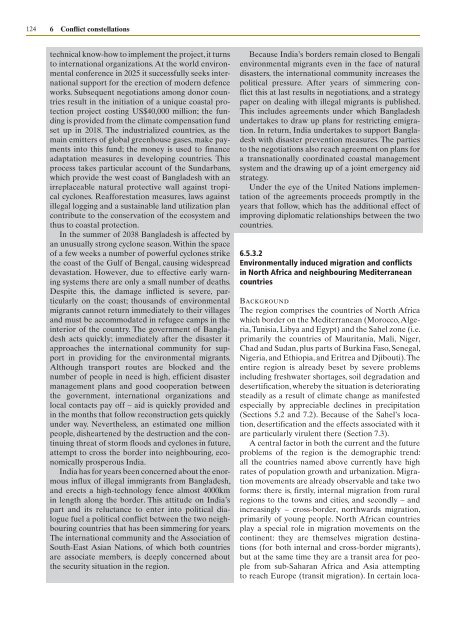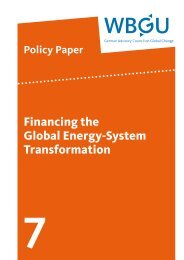World in Transition: Climate Change as a Security Risk - WBGU
World in Transition: Climate Change as a Security Risk - WBGU
World in Transition: Climate Change as a Security Risk - WBGU
Create successful ePaper yourself
Turn your PDF publications into a flip-book with our unique Google optimized e-Paper software.
124<br />
6 Conflict constellations<br />
technical know-how to implement the project, it turns<br />
to <strong>in</strong>ternational organizations. At the world environmental<br />
conference <strong>in</strong> 2025 it successfully seeks <strong>in</strong>ternational<br />
support for the erection of modern defence<br />
works. Subsequent negotiations among donor countries<br />
result <strong>in</strong> the <strong>in</strong>itiation of a unique co<strong>as</strong>tal protection<br />
project cost<strong>in</strong>g US$40,000 million; the fund<strong>in</strong>g<br />
is provided from the climate compensation fund<br />
set up <strong>in</strong> 2018. The <strong>in</strong>dustrialized countries, <strong>as</strong> the<br />
ma<strong>in</strong> emitters of global greenhouse g<strong>as</strong>es, make payments<br />
<strong>in</strong>to this fund; the money is used to f<strong>in</strong>ance<br />
adaptation me<strong>as</strong>ures <strong>in</strong> develop<strong>in</strong>g countries. This<br />
process takes particular account of the Sundarbans,<br />
which provide the west co<strong>as</strong>t of Bangladesh with an<br />
irreplaceable natural protective wall aga<strong>in</strong>st tropical<br />
cyclones. Reafforestation me<strong>as</strong>ures, laws aga<strong>in</strong>st<br />
illegal logg<strong>in</strong>g and a susta<strong>in</strong>able land utilization plan<br />
contribute to the conservation of the ecosystem and<br />
thus to co<strong>as</strong>tal protection.<br />
In the summer of 2038 Bangladesh is affected by<br />
an unusually strong cyclone se<strong>as</strong>on. With<strong>in</strong> the space<br />
of a few weeks a number of powerful cyclones strike<br />
the co<strong>as</strong>t of the Gulf of Bengal, caus<strong>in</strong>g widespread<br />
dev<strong>as</strong> tation. However, due to effective early warn<strong>in</strong>g<br />
systems there are only a small number of deaths.<br />
Despite this, the damage <strong>in</strong>flicted is severe, particularly<br />
on the co<strong>as</strong>t; thousands of environmental<br />
migrants cannot return immediately to their villages<br />
and must be accommodated <strong>in</strong> refugee camps <strong>in</strong> the<br />
<strong>in</strong>terior of the country. The government of Bangladesh<br />
acts quickly; immediately after the dis<strong>as</strong>ter it<br />
approaches the <strong>in</strong>ternational community for support<br />
<strong>in</strong> provi d<strong>in</strong>g for the environmental migrants.<br />
Although transport routes are blocked and the<br />
number of people <strong>in</strong> need is high, efficient dis<strong>as</strong>ter<br />
management plans and good cooperation between<br />
the government, <strong>in</strong>ternational organizations and<br />
local contacts pay off – aid is quickly provided and<br />
<strong>in</strong> the months that follow reconstruction gets quickly<br />
under way. Nevertheless, an estimated one million<br />
people, disheartened by the destruction and the cont<strong>in</strong>u<strong>in</strong>g<br />
threat of storm floods and cyclones <strong>in</strong> future,<br />
attempt to cross the border <strong>in</strong>to neighbour<strong>in</strong>g, economically<br />
prosperous India.<br />
India h<strong>as</strong> for years been concerned about the enormous<br />
<strong>in</strong>flux of illegal immigrants from Bangladesh,<br />
and erects a high-technology fence almost 4000km<br />
<strong>in</strong> length along the border. This attitude on India’s<br />
part and its reluctance to enter <strong>in</strong>to political dialogue<br />
fuel a political conflict between the two neighbour<strong>in</strong>g<br />
countries that h<strong>as</strong> been simmer<strong>in</strong>g for years.<br />
The <strong>in</strong>ternational community and the Association of<br />
South-E<strong>as</strong>t Asian Nations, of which both countries<br />
are <strong>as</strong>sociate members, is deeply concerned about<br />
the security situation <strong>in</strong> the region.<br />
Because India’s borders rema<strong>in</strong> closed to Bengali<br />
environmental migrants even <strong>in</strong> the face of na tural<br />
dis<strong>as</strong>ters, the <strong>in</strong>ternational community <strong>in</strong>cre<strong>as</strong>es the<br />
political pressure. After years of simmer<strong>in</strong>g conflict<br />
this at l<strong>as</strong>t results <strong>in</strong> negotiations, and a strategy<br />
paper on deal<strong>in</strong>g with illegal migrants is published.<br />
This <strong>in</strong>cludes agreements under which Bangladesh<br />
undertakes to draw up plans for restrict<strong>in</strong>g emigration.<br />
In return, India undertakes to support Bangladesh<br />
with dis<strong>as</strong>ter prevention me<strong>as</strong>ures. The parties<br />
to the negotiations also reach agreement on plans for<br />
a transnationally coord<strong>in</strong>ated co<strong>as</strong>tal management<br />
system and the draw<strong>in</strong>g up of a jo<strong>in</strong>t emergency aid<br />
strategy.<br />
Under the eye of the United Nations implementation<br />
of the agreements proceeds promptly <strong>in</strong> the<br />
years that follow, which h<strong>as</strong> the additional effect of<br />
improv<strong>in</strong>g diplomatic relationships between the two<br />
countries.<br />
6.5.3.2<br />
Environmentally <strong>in</strong>duced migration and conflicts<br />
<strong>in</strong> North Africa and neighbour<strong>in</strong>g Mediterranean<br />
countries<br />
Background<br />
The region comprises the countries of North Africa<br />
which border on the Mediterranean ( Morocco, Algeria,<br />
Tunisia, Libya and Egypt) and the Sahel zone (i.e.<br />
primarily the countries of Mauritania, Mali, Niger,<br />
Chad and Sudan, plus parts of Burk<strong>in</strong>a F<strong>as</strong>o, Senegal,<br />
Nigeria, and Ethiopia, and Eritrea and Djibouti). The<br />
entire region is already beset by severe problems<br />
<strong>in</strong>clud<strong>in</strong>g freshwater shortages, soil degradation and<br />
desertification, whereby the situation is deteriorat<strong>in</strong>g<br />
steadily <strong>as</strong> a result of climate change <strong>as</strong> manifested<br />
especially by appreciable decl<strong>in</strong>es <strong>in</strong> precipitation<br />
(Sections 5.2 and 7.2). Because of the Sahel’s location,<br />
desertification and the effects <strong>as</strong>sociated with it<br />
are particularly virulent there (Section 7.3).<br />
A central factor <strong>in</strong> both the current and the future<br />
problems of the region is the demographic trend:<br />
all the countries named above currently have high<br />
rates of population growth and urbanization. Migration<br />
movements are already observable and take two<br />
forms: there is, firstly, <strong>in</strong>ternal migration from rural<br />
regions to the towns and cities, and secondly – and<br />
<strong>in</strong>cre<strong>as</strong><strong>in</strong>gly – cross-border, northwards migration,<br />
primarily of young people. North African countries<br />
play a special role <strong>in</strong> migration movements on the<br />
cont<strong>in</strong>ent: they are themselves migration dest<strong>in</strong>ations<br />
(for both <strong>in</strong>ternal and cross-border migrants),<br />
but at the same time they are a transit area for people<br />
from sub-Saharan Africa and Asia attempt<strong>in</strong>g<br />
to reach Europe (transit migration). In certa<strong>in</strong> loca-
















